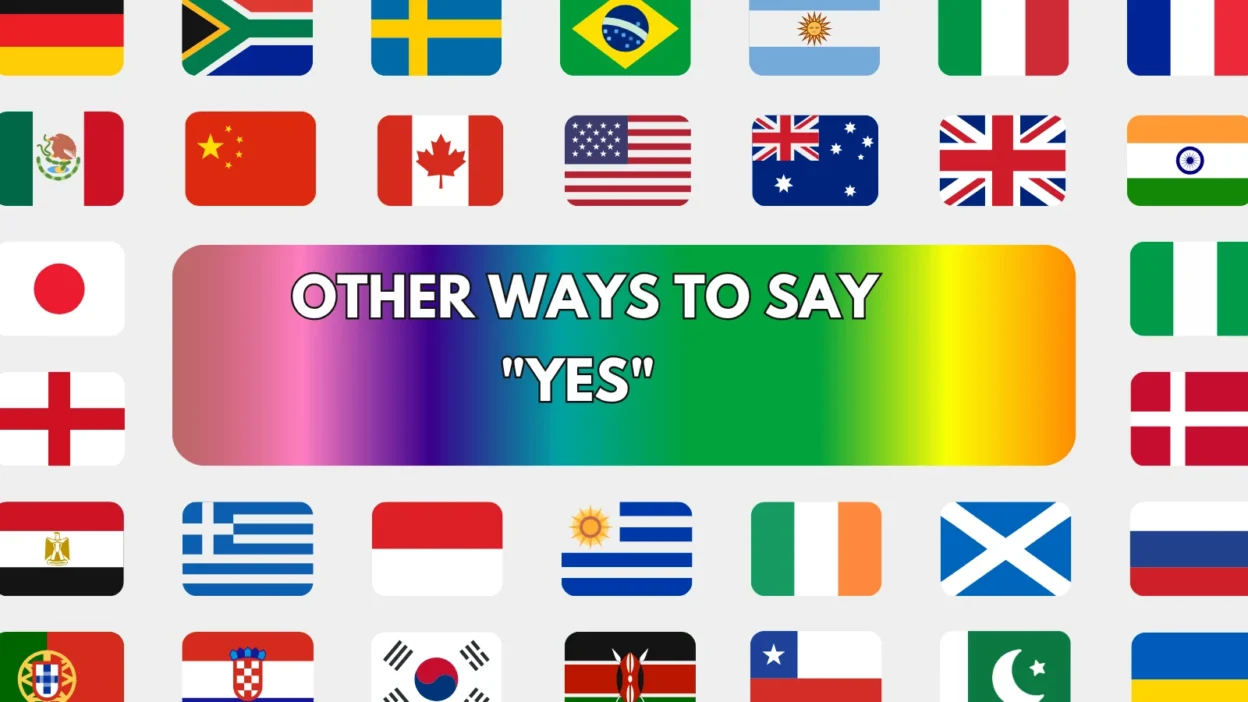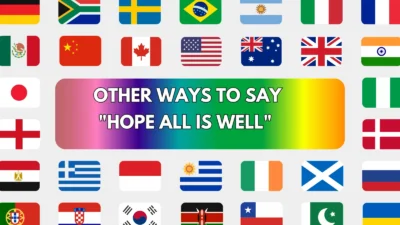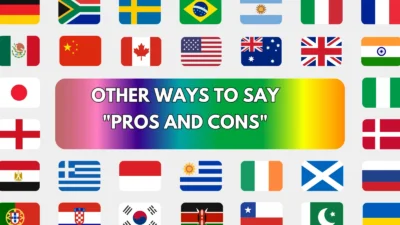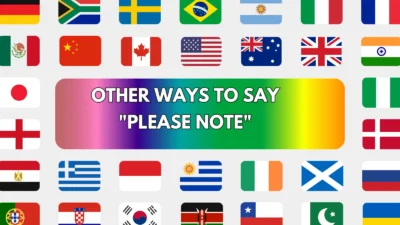The word “yes” is one of the most commonly used responses in English. Whether you’re agreeing, giving permission, or confirming something, “yes” is a simple, powerful word. But when you use it too often — especially in writing or professional conversation — it can feel repetitive or lack the right nuance.
That’s where variety helps! This article explores 25 useful and expressive alternatives to “yes”, so you can sound more natural, polite, enthusiastic, or formal — depending on the context.
1. Absolutely
Meaning:
Used to express strong agreement or certainty.
Detailed Explanation:
“Absolutely” adds emphasis to your agreement. It’s more powerful and enthusiastic than a plain “yes.”
Scenario Example:
Absolutely, I’d love to join you for lunch tomorrow.
Best Use:
Informal conversations, enthusiastic responses.
Tone:
Positive, strong, confident.
2. Certainly
Meaning:
A polite and affirmative way to agree or say yes.
Detailed Explanation:
Often used in professional or service-based settings to show willingness with courtesy.
Scenario Example:
Certainly, I can send you the report by noon.
Best Use:
Customer service, workplace communication.
Tone:
Polite, formal, helpful.
3. Of course
Meaning:
Used to express that something is obvious or readily agreed upon.
Detailed Explanation:
“Of course” suggests you’re happy to agree — often used when the answer is naturally or obviously yes.
Scenario Example:
Of course, I’ll help you with your presentation.
Best Use:
Friendly conversations, supportive replies.
Tone:
Warm, reassuring, casual.
4. Definitely
Meaning:
Expresses certainty or strong agreement.
Detailed Explanation:
“Definitely” implies strong confidence and assurance in your answer.
Scenario Example:
I’m definitely attending the conference next week.
Best Use:
Everyday conversations, decisions.
Tone:
Assured, energetic, informal.
5. Sure
Meaning:
A relaxed and casual way to say yes.
Detailed Explanation:
“Sure” is commonly used in informal situations. It’s positive, but not overly enthusiastic.
Scenario Example:
Sure, I can drive you to the station.
Best Use:
Texting, conversations with friends.
Tone:
Casual, easygoing, friendly.
6. Yep
Meaning:
A very informal way to say yes.
Detailed Explanation:
Used primarily in casual speech, especially in relaxed or familiar settings.
Scenario Example:
Yep, I already submitted the assignment.
Best Use:
Texts, casual chats.
Tone:
Informal, laid-back.
7. Yeah
Meaning:
An informal way of saying yes.
Detailed Explanation:
Similar to “yep,” “yeah” is relaxed and commonly used in everyday speech.
Scenario Example:
Yeah, I saw that movie last night.
Best Use:
Informal talks, casual emails.
Tone:
Conversational, relaxed.
8. Affirmative
Meaning:
A formal or military-style way of saying yes.
Detailed Explanation:
Often used in official, technical, or military contexts to confirm actions.
Scenario Example:
Command received. Affirmative, we’re moving forward.
Best Use:
Technical, military, formal instructions.
Tone:
Serious, structured, formal.
9. Indeed
Meaning:
Used to confirm or agree, often with emphasis.
Detailed Explanation:
“Indeed” can be used alone or to confirm a previously mentioned idea.
Scenario Example:
Indeed, that’s a great point you made.
Best Use:
Academic writing, formal speech.
Tone:
Formal, polished, literary.
10. Without a doubt
Meaning:
Complete certainty or agreement.
Detailed Explanation:
Stronger than a simple yes — it adds confidence and conviction.
Scenario Example:
Without a doubt, she’s the best candidate for the role.
Best Use:
Persuasive writing, strong affirmations.
Tone:
Confident, persuasive.
11. By all means
Meaning:
Polite way of granting permission or agreeing to a request.
Detailed Explanation:
Shows generosity or support with a formal tone.
Scenario Example:
By all means, use my office if you need quiet.
Best Use:
Professional permission, polite dialogue.
Tone:
Formal, courteous, generous.
12. Totally
Meaning:
A very casual and enthusiastic way of agreeing.
Detailed Explanation:
Often used in spoken English for emphasis or excitement.
Scenario Example:
Totally, that’s exactly what I was thinking too!
Best Use:
Friendly chats, energetic exchanges.
Tone:
Enthusiastic, informal.
13. Naturally
Meaning:
Suggests that the agreement or response is obvious.
Detailed Explanation:
Used to express that something goes without saying.
Scenario Example:
Naturally, I’ll be at your graduation ceremony.
Best Use:
Warm, supportive communication.
Tone:
Gentle, classy, thoughtful.
14. I agree
Meaning:
Directly states alignment with an opinion or idea.
Detailed Explanation:
Clear and direct; great for discussions and debates.
Scenario Example:
I agree — we should simplify the process.
Best Use:
Discussions, teamwork, debates.
Tone:
Assertive, collaborative.
15. Sounds good
Meaning:
Informal way to approve or agree to something.
Detailed Explanation:
More about agreement to a suggestion rather than stating “yes” explicitly.
Scenario Example:
Let’s meet at 3 p.m.? — Sounds good!
Best Use:
Scheduling, casual planning.
Tone:
Casual, friendly.
16. Roger that
Meaning:
Acknowledges and agrees to a command or instruction.
Detailed Explanation:
Originally military slang, now sometimes used informally for fun or in tech settings.
Scenario Example:
Roger that. I’ll handle the email list.
Best Use:
Tech teams, gaming, casual humor.
Tone:
Informal, playful, direct.
17. Certainly so
Meaning:
An elevated or polite way to express agreement.
Detailed Explanation:
More formal than “certainly” alone, often used in speeches.
Scenario Example:
Certainly so, we will support the initiative.
Best Use:
Ceremonial or professional speech.
Tone:
Polished, formal, ceremonial.
18. No problem
Meaning:
Says yes by confirming willingness without issue.
Detailed Explanation:
Used to reassure someone that a request is easy to fulfill.
Scenario Example:
Can you help me carry this? — No problem!
Best Use:
Casual offers, customer service.
Tone:
Friendly, relaxed.
19. Fine by me
Meaning:
Indicates passive or easygoing agreement.
Detailed Explanation:
It means you have no objection or are okay with a decision.
Scenario Example:
We’ll eat at 6 p.m. — Fine by me.
Best Use:
Informal approval, group decisions.
Tone:
Easygoing, casual.
20. Sure thing
Meaning:
A cheerful and casual way to say yes.
Detailed Explanation:
Adds friendliness and approachability to your agreement.
Scenario Example:
Could you forward me the file? — Sure thing!
Best Use:
Emails, customer responses, everyday talk.
Tone:
Friendly, warm, casual.
21. Okay
Meaning:
Common and simple way to agree or approve.
Detailed Explanation:
Universally understood and acceptable in almost any context.
Scenario Example:
Okay, I’ll meet you there at 5.
Best Use:
Everyday speech, texting.
Tone:
Neutral, flexible.
22. All right
Meaning:
Another standard way to confirm agreement or approval.
Detailed Explanation:
Adds a slightly more relaxed or supportive tone than “yes.”
Scenario Example:
All right, let’s begin the session.
Best Use:
Conversations, instructions.
Tone:
Supportive, laid-back.
23. Consider it done
Meaning:
An enthusiastic way to promise completion of a task.
Detailed Explanation:
Used to show eagerness and efficiency in handling something.
Scenario Example:
Can you call the client? — Consider it done!
Best Use:
Workplace, informal promises.
Tone:
Confident, proactive.
24. You bet
Meaning:
An informal and enthusiastic way to say yes.
Detailed Explanation:
Often used in American English to express cheer and readiness.
Scenario Example:
Can you help us move? — You bet!
Best Use:
Friendly conversations, offers of help.
Tone:
Energetic, casual.
25. Gladly
Meaning:
Says yes with enthusiasm and willingness.
Detailed Explanation:
Great for offering help or showing positive energy.
Scenario Example:
Gladly, I’ll review your draft tonight.
Best Use:
Polite replies, team settings, helpful tone.
Tone:
Warm, generous, upbeat.
Conclusion
While “yes” is useful and essential, using the same word repeatedly can make your communication sound dull or one-dimensional. These 25 diverse alternatives allow you to add emotion, professionalism, or warmth to your agreement — depending on the situation.

Naz Fatima is an author at Saypadia who specializes in writing clear, relatable, and reader-friendly content about language, expressions, and modern terminology. She enjoys breaking down meanings with real-life context so readers can quickly understand and apply them. Naz’s work reflects a strong commitment to clarity, accuracy, and helping users find quick answers without confusion.




